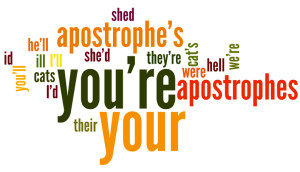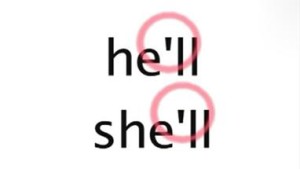You’re vs. Your – When to Use Apostrophes
English can be a tough language. This is especially true for those who are not native speakers, and most definitely true for those who may be studying English as a foreign language. With the advent of the internet and all it entails, many grammatical errors have become commonplace. It can be difficult to tell when one is mistaken, which is why we are here to help you out and make your life easier!

Apostrophe
One mistake in particular, one which keeps on being made – even by natives sometimes – is using the word you’re when in fact the word your should be used, and vice versa.
So, what is the difference really? Well, generally speaking, the word your indicates possession, meaning that something belongs to you. Examples:
- Is this your apple?
- What is your opinion on the matter?
- Your Highness, we are ready to begin!
The word you’re, on the other hand, is a contracted word (a word made shorter) which simply means “you are”. In this case, the apostrophe is used in place of the letter A, transforming what would be two separate words (you are) into a single word (you’re). Examples:
- These are not the droids you’re looking for.
- Does that mean you’re serious?
- Old Nehamkin, you’re the most wrinkled man in all of Krakow.
Used in a single sentence, both words would appear in this fashion:
The whiteness of your teeth shows that you’re brushing twice a day.
Alternatively, that very same sentence could also be written without the apostrophe, like so:
The whiteness of your teeth shows that you are brushing twice a day.
Apostrophes are used in several ways: either as an indication of possession, or as an omitting punctuation mark. The omission can be in the middle or beginning of a word.
As a possessive, it appears in this way:
- Tom’s water bottle is filled with juice.
- The tiger’s teeth are sharp and jagged.
- It appears you are wearing a lady’s hat.
Usage of an apostrophe in the beginning of a word means it was two words which were shortened to one. Examples:
- ‘Twas the night before Christmas – it was.
- Why, ‘twould be my pleasure, good sir knight – it would.
- If ‘twere me, I would not be so quick to judge – it were.
When using the apostrophe as a possessive punctuation mark, it is always one word to begin with. When using the apostrophe as an omitting punctuation mark, the single word can be broken up into two. Of course, there are rules of punctuation that you must follow in order to write properly.
An apostrophe may not be used to pluralize numbers, capital letters, and initials which are used as nouns. Examples:
- Back in the 1990’s, things were different – INCORRECT
- Back in the 1990s, things were different – CORRECT
- Three MC’s and one DJ – INCORRECT
- Three MCs and one DJ – CORRECT
- His report card showed straight A’s – INCORRECT
- His report card showed straight As – CORRECT

He’ll and She’ll
An apostrophe should not be used for pluralizing names.
- The Roths are coming for dinner – CORRECT
- The Roth’s are coming dinner – INCORRECT
- I visited the Millers yesterday – CORRECT
- I visited the Miller’s yesterday – INCORRECT
Apostrophes can make all the difference – brush up on the difference of were vs we’re
No comments yet.